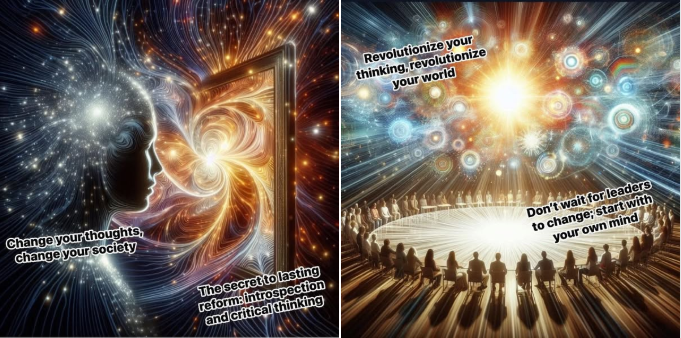
Kavi had long been a keen observer of human behavior, and one pattern particularly troubled him: the common belief that all of society’s problems stem solely from the individuals in power. Many assumed that if the corrupt or misguided leaders were removed, all evils would vanish like dark clouds dispersing under a bright sun. Time and again, people would proclaim that replacing these figures was the key to progress, believing that the solution was as simple as a change in leadership.
During a period of intense political unrest, Kavi witnessed his community erupt in protest. The masses decried their current leaders, convinced that the source of their misery lay solely in those at the helm of power. In their eyes, the promise of reform was inextricably tied to the removal of these figures. However, even after a new leader took office, the familiar cycle of injustice and discontent continued unabated.
Pondering these events, Kavi arrived at a startling realization: the true root of societal evils was not confined to the individuals in power, but was embedded in the very way people thought. The mindset that glorified power, equated success with material gain, and sought immediate, superficial fixes was the real culprit. It was a thinking pattern that turned personal ambition into oppression and short-sighted gain into long-term decay.
Kavi understood that while changing the face of authority might offer a momentary reprieve, it did little to alter the underlying consciousness of society. The secret of true reform, he discovered, lay in the transformation of human thought itself. Real change required an internal revolution—a shift in how individuals perceived their values, their relationships, and their responsibilities toward one another.
The Framework for Transforming Human Consciousness
Determined to guide his community toward a more sustainable path, Kavi proposed a comprehensive framework for reform centered on transforming human consciousness:
Self-Awareness:
Encourage each individual to reflect on their own thought processes. Recognize that the seeds of injustice and discord are often sown within our own minds, through unexamined biases and unchallenged beliefs.
Education and Open Dialogue:
Promote a culture of continuous learning and honest conversation about ethics and values. By questioning longstanding assumptions and engaging in meaningful discussions, communities can dismantle the destructive thought patterns that lead to oppression.
Mindful Living:
Advocate for practices such as prayer and mindfulness. These tools help cultivate inner peace and clarity, reducing the impulsiveness and divisiveness that fuel societal discord.
Collective Responsibility:
Stress that real reform is not achieved by simply changing leaders. Instead, it requires a community-wide shift in consciousness—a commitment to empathy, rationality, and ethical living that transcends the allure of quick fixes.
Reforming Media Consumption:
Recognize that media culture and one-sided reporting play a significant role in corrupting people’s mindsets. By forming opinions based solely on skewed or incomplete information, individuals develop faulty views and impaired reasoning. Rather than merely complaining about biased media, Kavi urged that we reform our own thinking. By cultivating the ability to engage in right thinking and critical reflection, we can learn to navigate and counteract the influence of distorted reporting.
The Lasting Impact
Kavi’s insights served as a powerful reminder: the secret of reform lies not in the superficial exchange of power but in the profound transformation of the human mind. When individuals embrace self-awareness, open dialogue, mindful living, and critical media consumption, they begin to dismantle the very thought patterns that sustain injustice.
As more members of the community adopted this framework, they discovered that true progress was not measured by the removal of corrupt leaders alone, but by the enduring change in how they thought and interacted with one another. This internal revolution, Kavi believed, was the only path to eradicating the underlying evils that had long plagued society.
Kavi’s teachings resonated far beyond his own community, inspiring others to look inward for the seeds of change. He had uncovered the hidden truth: the secret of reform lies in transforming human consciousness—a transformation that paves the way for a just, compassionate, and truly reformed society.

